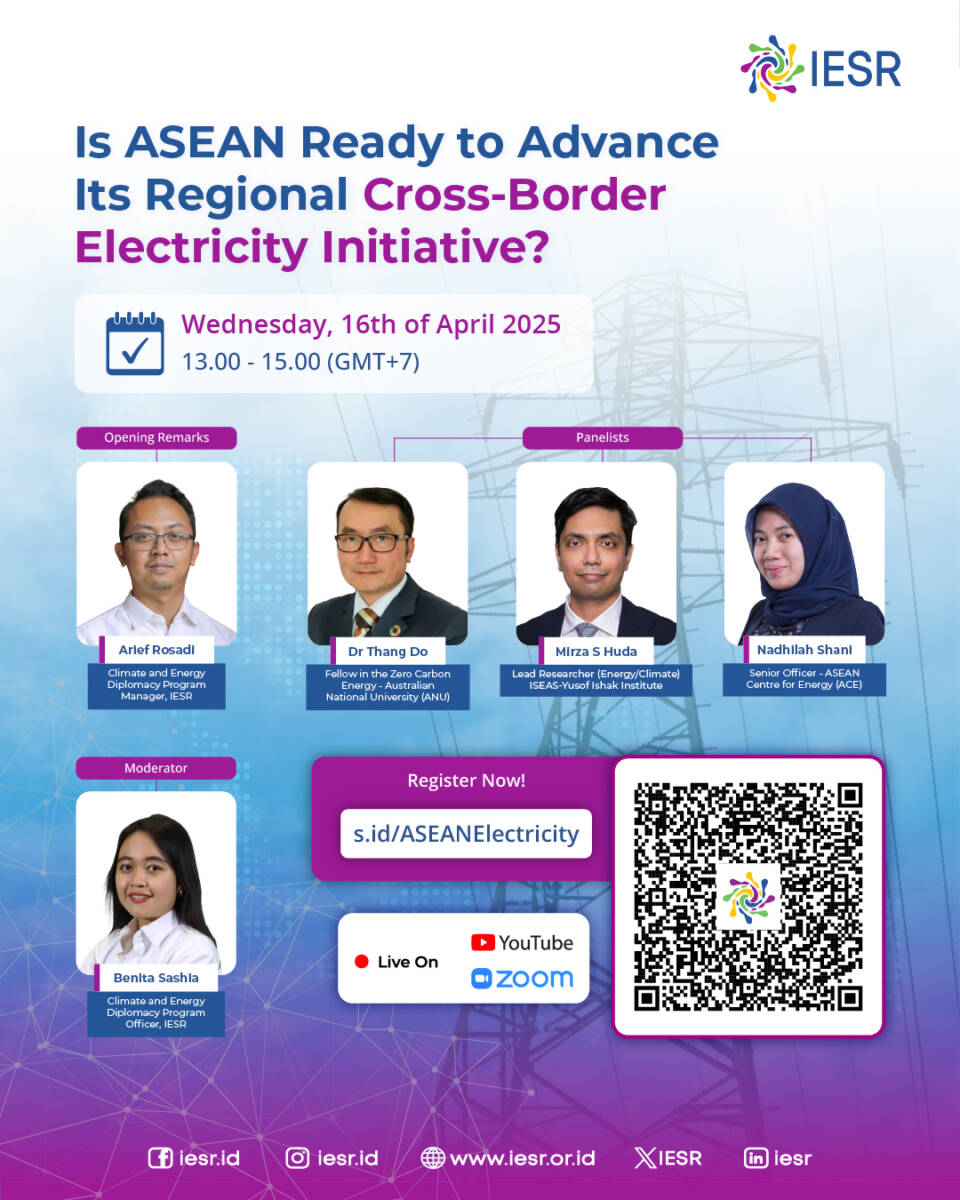
Public Webinar: Is ASEAN Ready to Advance Its Regional Cross-Border Electricity Initiative?
Background
Electricity coverage varies greatly across Southeast Asia, with some nations, such as Singapore and Brunei, having 100% coverage and others, such as Myanmar, having only 66% coverage. Electricity coverage, like in many other countries, helps to alleviate poverty, promote economic growth, and raise public living standards. However, enhancing energy security in Southeast Asia presents another challenge. The electrical industry is one of the main producers of greenhouse gas emissions, and thus the greatest source of potential emissions reductions. For example, CO2 emissions from energy generation in ASEAN has risen from 213 MtCO2 in 2000 to 531 MtCO2 in 2015 and 861 MtCO2 by 2025, respectively. The primary cause of this increased carbon emission is none other than the region’s reliance on fossil fuels, notably coal, oil, and natural gas, which emit considerable amounts of carbon dioxide when burned to generate electricity.
To enhance energy security in the region without adding to rising carbon emissions, Southeast Asia should focus on improving regional electricity connectivity projects. Since 1997, ASEAN has worked to integrate its electrical networks regionally through the ASEAN Power Grid (APG), which is expected to facilitate electricity trade, strengthen grid resilience, and enhance regional electricity trade, notably from clean energy sources such as hydropower, solar, and wind power. This project fits Southeast Asia’s abundance of renewable energy resources—estimated at up to 17 Terawatts (TW)—making it technically and economically feasible for the region to achieve Net Zero Emissions with 90%-100% renewable energy by 2050. Enhanced electricity integration might also prevent the region from adding 154 MW, saving $1.87 billion by 2025. So far, the ASEAN Centre for Energy has identified 18 potential cross-border interconnections (9 new and 9 existing), with a total capacity of 33 gigawatts by 2040. However, the planned launch of the APG roadmap in 2023 has been postponed due to consensus reasons among ASEAN Member States (AMS). Furthermore, the APG Memorandum of Understanding (MoU), which obliges AMS to build the electricity grid since and took effect in 2009, also expired in March 2024 last year.
Despite some obstacles, the ASEAN Power Grid has demonstrated its exceptional capabilities. For example, the Lao PDR-Thailand-Malaysia-Singapore Power Integration Project (LTMS-PIP) transmission launch has been a successful multinational power trade agreement on the western side of Southeast Asia. The Brunei-Indonesia-Malaysia-Philippines Power Integration Project (BIMP-PIP), which aims to integrate grids throughout the eastern half of the region, is currently in its next phase. But before ASEAN can proceed with the cross-border interconnectivity project, it must overcome disagreements among AMS and finalise the enhanced MoU. Malaysia’s ASEAN Chairmanship 2025 will propose 15 major priority economic deliverables (PEDs), in which two of them are energy-related focus: securing AMS’ agreement and support on the ASEAN Plan of Action for Energy Cooperation (APAEC) 2025 Phase 1: 2026-2030 and the Asean Power Grid (APG) Enhanced MoU. The Malaysian Government has highlighted that the APG initiative along with the finalisation of its Enhanced MoU will be the one of the key focuses of Malaysia’s ASEAN Chairmanship this year. In the sense of facilitating the fruitful discussion as well as understanding the recent updates of APG, the Institute of Essential Services Reform (IESR) will organise a regional webinar to discuss the latest development of and the multidimensional challenges surrounding the region’s grid connectivity project.
Objectives
To understand the latest updates of Southeast Asia’s cross-border electricity connectivity as well as optimising the existing ASEAN cross-border electricity trade initiatives through tackling the multidimensional challenges of advancing the ASEAN Power Grid.
Presentation
Nadhilah Shani _ ACE – Updates on Regional Power Connectivity and Trade in Asean
Updates-on-Regional-Power-Connectivity-and-Trade-in-Asean-Nadhilah-ShaniDr. Thang Nam Do _ ANU – Cross-border Electricity Trade in Southeast Asia
Cross-border-Electricity-Trade-in-Southeast-Asia-Dr.-Thang-Nam-DoSpeakers
-
Arief Rosadi - Climate and Energy Diplomacy Program Manager IESR
-
Dr Thang Do - Fellow in the Zero-Carbon Energy for Asia-Pacific Environment and Development Program - Australian National University (ANU)
-
Mirza Sadaqat Huda - Lead Researcher (Energy/Climate) - ISEAS-Yusof Ishak Institute
-
Nadhilah Shani - Senior Officer on Power Fossil Fuel Alternative Energy and Storage (PFS) Department - ASEAN Centre for Energy (ACE)
-
Benita Sashia Jayanti - Climate Diplomacy Program Officer IESR
-
Rizky Tazkia Harjanto - Climate Action Officer - IESR

